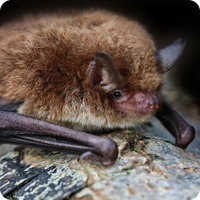What is Rabies?
 Rabies is a preventable viral disease of mammals most often transmitted through the bite of a rabid animal. The vast majority of rabies cases reported to the Centers for Disease Control and Prevention (CDC) each year occur in wild animals such as raccoons, skunks, bats and foxes. Squirrels, chipmunks, mice, rats and rabbits rarely are affected by rabies and are not known to have transmitted rabies to humans. Domestic animals account for less than 10% of the reported rabies cases, with cats, cattle and dogs most often reported rabid.
Rabies is a preventable viral disease of mammals most often transmitted through the bite of a rabid animal. The vast majority of rabies cases reported to the Centers for Disease Control and Prevention (CDC) each year occur in wild animals such as raccoons, skunks, bats and foxes. Squirrels, chipmunks, mice, rats and rabbits rarely are affected by rabies and are not known to have transmitted rabies to humans. Domestic animals account for less than 10% of the reported rabies cases, with cats, cattle and dogs most often reported rabid.
The last confirmed case of human rabies in Virginia occurred in 2009. Prior to that, the last confirmed human deaths in Virginia associated with rabies occurred in bat rabies cases in 1998.

Signs of Rabies
Some symptoms of rabies include:
- Excessive drooling or foaming at the mouth
- Erratic walking as if drunk, walking in circles or with an unsteady gait
- Extreme lethargy exhibited by an animal that would normally startle and run away when frightened
- Unexpected aggression from an animal that would normally startle and run away when frightened
Not all rabid animals display these behaviors. Many times, animals with mange or distemper are mistaken for rabid animals. Some people assume that if a nocturnal animal spotted during the day has rabies, but this is not always the case; many animals (including raccoons, opossums and foxes) have become habituated to humans and will seek out food when hungry — even during daylight hours. If you see a wild animal that appears to be in distress, please call the AWLA at 703-746-4774. Our staff can help determine if a wild animal is in distress and needs the assistance of our trained Animal Services Officers.
How to Keep Yourself and Your Pets Safe
1. Vaccinate your pets against rabies. State law and City ordinance require that all dogs, cats and ferrets be vaccinated against rabies.
2. DO NOT FEED OR APPROACH WILD ANIMALS. Never encourage a wild animal to approach you, your child or pet. Even the cutest animals can scratch or bite when startled or when they feel threatened.
3. Never leave your dog unattended in the yard and do not allow your cat to roam the neighborhood. Pets can be harmed by other animals or injured by cars.
4. If a wild animal has entered your home, call the AWLA immediately for assistance. Do not attempt to trap or touch the animal.
5. Do not approach a stray or unknown dog or cat on the street. Every animal’s temperament is different, and every animal can bite if he or she feels threatened. If a stray animal needs help, call the AWLA at 703-746-4774.
If you or your pet have been bitten by a wild animal, thoroughly wash the wound with soap and water and try to keep the wild animal in sight; then, contact the AWLA. An Animal Services Officer will attempt to locate and trap the animal. Contact your doctor or veterinarian for further wound care instructions.
What to Know About Dog Bites in Alexandria
In an emergency, call 911. If a situation is not an emergency, call the Alexandria Police at 703-746-4444.
Gather information, including time and date; details of how it happened; whether the bite occurred on public or private property; witness name and contact info; information about the biting dog, including name, age, description, rabies vaccination and license number (should be on tags on the dog's collar), owner's name and contact info (from the dog's collar); and situational information, such as whether the dog was on a leash, may have been in pain or protecting itself or others at the time of the bite, or if it was a police dog or participating in a dog-handling event.
When a dog is involved in a biting incident, it must be observed for 10 days to watch for rabies. Animal Services will provide an "Observation Form" to the owner of the biting dog within 10 days. The owner will be responsible for following the observation instructions and should take precautions to keep the dog from biting again.
The Alexandria Health Department will contact the victim with guidance on rabies prevention and/or treatment. They can be reached at 703-746-4910.
To ensure that a biting dog isn't dangerous, Animal Services will investigate the bite and determine if the dog meets the legal criteria for being considered a "dangerous dog." Most biting dogs are not determined to be dangerous, and even dogs determined to be dangerous may still be permitted to stay in their homes.
Help prevent dog bites by:
- Keeping your dog on a leash in public
- Avoiding scary situations with a fearful dog
- Knowing if food or toys may instigate guarding or aggression in your dog
- Not visiting dog parks if your dog is reactive

